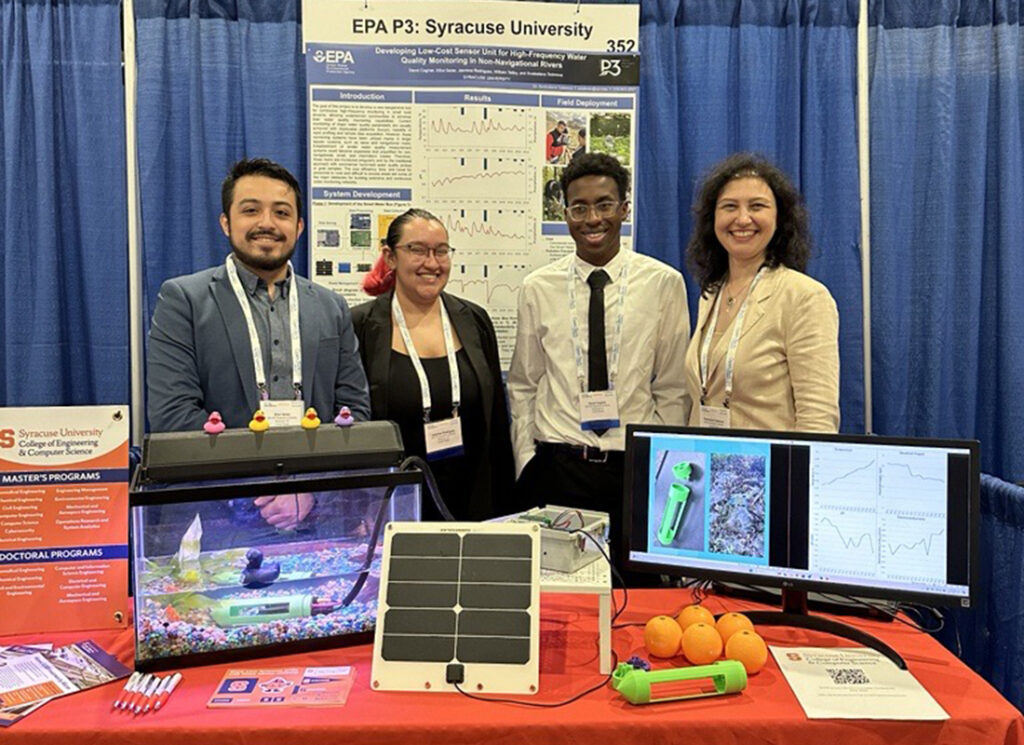
Civil and environmental engineering professor Svetoslava Todorova, retired electrical engineering and computer science professor William Tetley, engineering students David Coghiel ‘24 (civil engineering), Elliot Salas ‘24 (electrical engineering) and Jasmine Rodriguez ‘25 (mechanical engineering) participated in the TechConnect World Innovation Conference and Expo in Washington, DC from June 17-19. The group was a recipient of the U.S. Environmental Protection Agency’s (USEPA) People, Prosperity and the Planet (P3) competitive program grant.
The EPA’s P3 program is a competition where undergraduate/graduate student teams design sustainable solutions to real-world environmental challenges. Todorova, Tetley, Coghiel, Salas and Rodriguez showcased their Smart Water Box, a low-cost sensor unit designed to monitor water quality in small rivers, in a 90-second sales pitch and answered questions in a booth where they displayed their sensor unit.
“The TechConnect World Innovation Expo was a great opportunity that I utilized to network with other student researchers, government agencies, and private companies,” says Rodriguez. “As one of the few student attendees, it was easy to stand out and make better connections with the professionals I interacted with. The P3 National Student Design Competition also gave me valuable insight into what other universities are researching and what issues are at the forefront of people’s concerns when it comes to our environment.”
“Our project stood out as a cost-effective, low-maintenance, solar-powered alternative to traditional water quality monitoring systems. I assisted with the development of the unit and fieldwork to ensure its continuous operation,” says Coghiel. “I was able to connect with different universities and companies to share experiences, knowledge, and accomplishments. Furthermore, introducing our project in an elevator pitch and a booth in the conference hall gave us valuable presentation experience that is bound to help us in our careers.”
P3 has a two-phase program where teams receive $25,000 for a one-year award. The expo concluded phase 1 of the EPA P3 award cycle and the group will compete for the second round of funding in phase 2 during the fall.
“The experience of presenting our project to other schools and EPA representatives was incredibly rewarding,” says Salas. “I was also thrilled to support my team and celebrate their achievements, like David’s impressive elevator pitch and Jasmine’s unique 3D prints, which are integral to our project. While I served a significant role in this project, I must acknowledge the collective effort of our group and the guidance of our mentors, Svetla and William. The time spent in DC was enjoyable and inspiring, and I eagerly anticipate the future improvements our group will make to the water quality monitoring box.”
“Although we discuss the need of using a multifaceted approach in solving contemporary issues, at college level students are often taught in silos. This design project stimulated interdisciplinary collaboration and creativity by bringing together students from three different engineering departments,” says Todorova. “I am extremely proud of their motivation, team spirit, and drive for success. The team stood out with their 90-seconds sales pitch. Everyone came to congratulate us. We are thankful to Linda Hartsock, Strategic Advisor at SU Libraries, for her invaluable guidance and tips in developing a strong sales pitch.”
